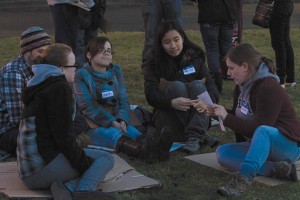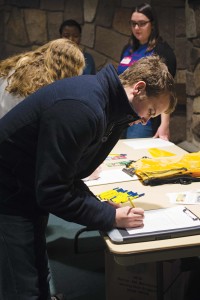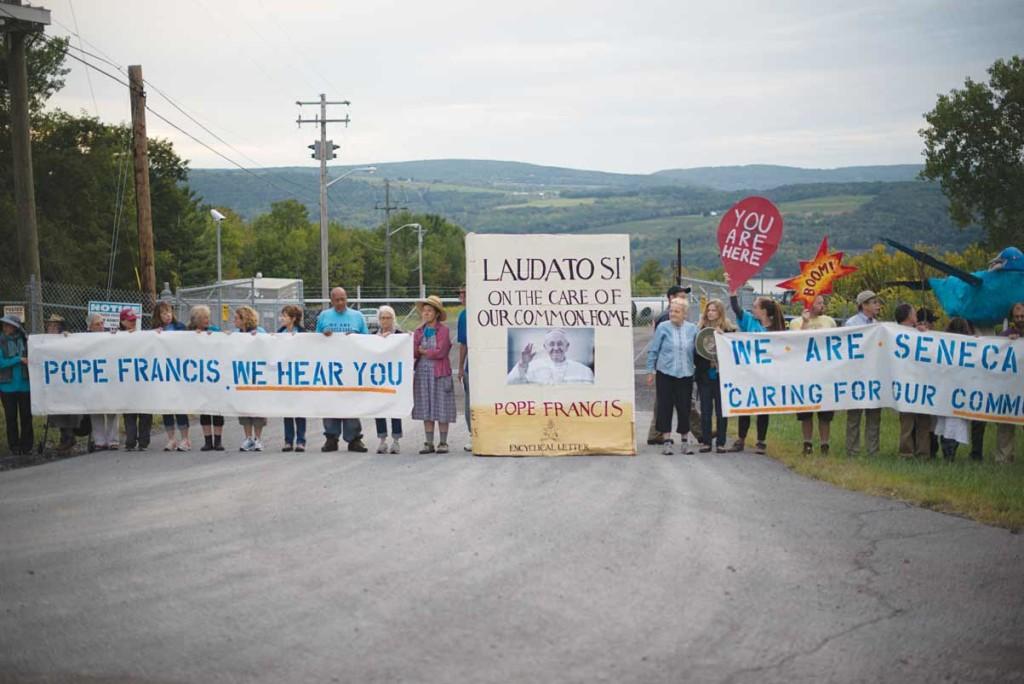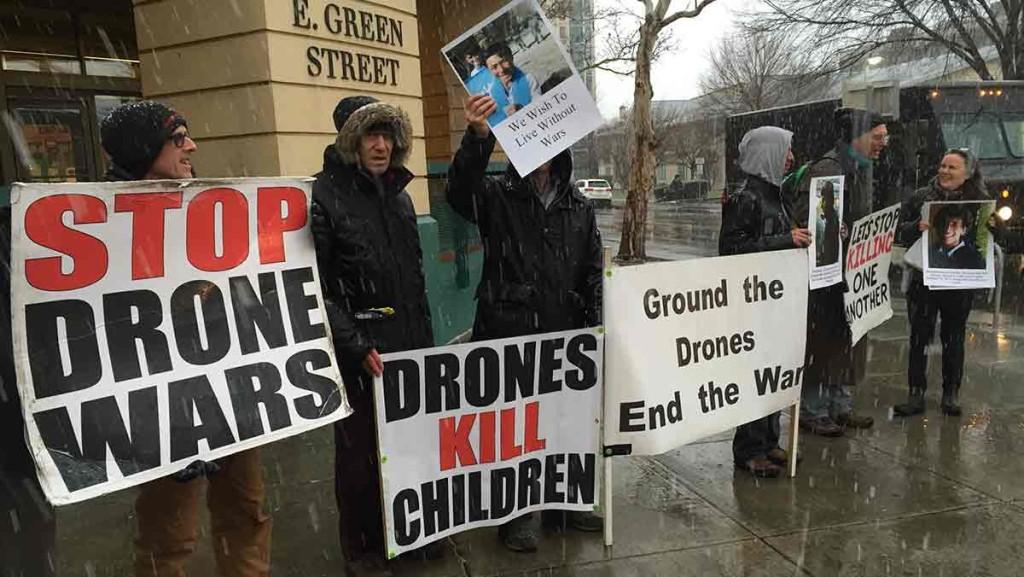From the numerous “Frack Off” signs that could be found at Ithaca businesses before fracking was banned last year, to the protests over storing natural gas underneath Seneca Lake, to students at Ithaca College promoting racial justice, activism has roots in various aspects of life in Ithaca. And for some involved in these causes and others, this activism comes from their faith in the teachings of God.
Much of the news regarding religious activism focuses on the religious right, such as the anti-abortion movement lobbying for anti-abortion laws and the defunding of Planned Parenthood.
In contrast, the religious communities within the college and throughout the City of Ithaca have promoted social justice and engaged in activism on a variety of causes and issues with the goal of fostering a more just society. Much of the social justice work these groups have done comes from a more left-leaning, liberal perspective.
Junior Emma Grabek, service/social justice chair of the Protestant Community Council, said the college’s Protestant Community has heavily participated in social justice work, including a program called Love Does Ithaca.
“It’s called Love Does Ithaca, with the mentality that love should do, and we want to be the kind of people that really engage in making a difference, instead of just talking about it, having our love be really active in the community,” Grabek said.
Grabek said through the program, the Protestant Community engaged with older adult populations at Longview, a senior living community; kids at the Ithaca Children’s Garden; and at Young Life, a Christian organization that partners with kids.
In addition, Grabek said the Protestant Community has worked with the homeless population in Ithaca by volunteering at Loaves and Fishes of Tompkins County, an organization that provides free meals and hospitality to those in need.
Grabek said she’d love to say the church and Protestantism is an example to follow in terms of activism, but she said Christianity sometimes ends up on the wrong side of certain issues.
“I wish Christians were known for being for love and not against people because that’s really what I think the Ithaca Protestant Community stands for,” Grabek said. “We are for loving people and never against people.”
However, Grabek added that while Protestantism contains a range of ideologies, Protestants are united in their efforts to help others.
“The unique thing about being part of the Protestant faith is it’s such a wide variety of Christians, separated from liberals to conservatives, and we definitely encompass all of that here at IC,” Grabek said. “I think our common denominator, I would like to say, is that people want to seek justice and be part of a loving type of community.”
Also engaging in activism is the First Presbyterian Church of Ithaca. Brad McFall is the chairman of the church’s social justice–focused committee: “Justice, Peace and Integrity of Creation.” He said JPIC engages in social justice work regarding issues such as environmental protection.
“With climate change issues, that is something we’ve been very active in,” McFall said. “I myself, as part of the committee, met together with a couple of other people, and we helped to sponsor the Ithaca Climate March, which happened in conjunction with the big march in New York City.”
The People’s Climate March in New York City took place in September 2014 and attracted an estimated 311,000 people according to The New York Times.
Additionally, McFall said he has been involved in encouraging the United States Presbyterian Church (U.S.A.) to divest from fossil fuels, which it will decide on in June. He said the motion to divest the church pension from fossil fuels has been passed all the way up to that church and has been endorsed by 17 presbyteries.
McFall said another environmental issue JPIC was involved in was fighting to end fracking — drilling into the earth to extract gas — which advocates say is environmentally destructive. In June 2015, New York banned the practice.
McFall said there is power in combining the Bible with science and environmental activism.
“I would say that one very important thing that the Bible brings that science often doesn’t — especially enlightened science, I have studied evolutionary theory and ecology at Cornell — is it allows you to have a holistic perspective,” he said.
Another way to think about social justice work is in the way God is presented in the Bible, McFall said.
“The principal idea that one might think about religiously is that God is both a creator and a redeemer of the creation,” he said. “And you can trace this theme throughout the Bible all the way from the Old to the New Testament.”
Elmer Ewing, a member of the First Presbyterian Church, said the church has also advocated for a place to be found locally to resettle refugees and has supported the Black Lives Matter movement.
Ewing also said members of the First Presbyterian Church spearheaded the creation of the Friendship Center in Ithaca, where homeless individuals can get warm during the day.
Dave Holmes, campus minister for the Catholic Community, said the college’s Catholic Community has also done work with homelessness. Holmes said the group did a “Hunger Homeless Sleepout” two years ago, where they slept outside on a cold April night to see what being homeless is like.
“One of the things that we kind of talked about is we are going to be miserable tonight, but we are in a much better place than any homeless person because we’re safe,” Holmes said.

Holmes said the group also held a “Public Policy Sunday” on Feb. 7 and collected signatures to lobby the state government for an extra $190 million for childcare subsidies.
Additionally, two years ago, the Catholic Community engaged in a campaign to end solitary confinement.
“What United Nations says is if anyone is kept in solitary confinement for more than three days, they have determined it cruel and unusual punishment,” Holmes said. “What happens in the United States is solitary confinement is used for very long, extended periods, averaging 14 days but can go up to 19–20 days.”
Holmes said the group brought a cell used for solitary confinement to campus to educate the community about the problems with solitary confinement.
Overall, the work the Catholic Community has done goes back to Catholic social teaching — the Catholic Church’s edicts regarding social justice — Holmes said.
“Volunteering and service is an act of social justice, it’s an act of caring for another person, which is what Jesus Christ calls us to do,” Holmes said.
Holmes said social justice has always been part of Catholicism. However, he said Pope Francis — who has been active on a variety of issues, including climate change and economic inequality — has brought social justice to the center of the conversation in Catholicism. Many of Pope Francis’ stances on environmental and economic issues, as well as social issues, are more liberal than the stances of his papal predecessors.
“It’s always been there, but he’s really pushing it to the forefront,” Holmes said. “And it’s really because of where he lived. He grew up in Argentina, witnessing the poorest of the poor, and it’s really because of that history. That doesn’t leave him just because he’s moved to Vatican City.”

Sam Fuller/The Ithacan
Birthright of Ithaca, a local chapter of the non-profit organization Birthright International, is a anti-abortion social activist group that provides support to women faced with unplanned pregnancies. Throughout the years, Holmes said, IC students have volunteered with Birthright of Ithaca.
Furthermore, on a national scale, the anti-abortion movement has been growing across conservative religious Christian groups, such as Operation Rescue and Priests for Life. These organizations, among others, have formed what can be considered the “religious right,” with their passion for anti-abortion policies rooted in the Christian belief in protecting life.
Another group in Ithaca engaging in religious activism is the Ithaca Catholic Worker Community.
Laurie Konwinski, one of the Ithaca Catholic Workers, said the group has protested against conflict and violence.
“There’s a lot of emphasis on peacemaking, certainly standing up for nonviolence, standing against war,” Konwinski said. “And here in Ithaca, certainly we have a lot of history of opposition to war, and currently opposition to the use of drones in bombing raids.”
Konwinski said the Catholic Worker Movement dates back to the 1930s and the activism of Dorothy Day, one of the founders of the movement. The movement is based on believing in the God-given dignity of every person and is committed to “nonviolence, voluntary poverty and the Works of Mercy as a way of life.”
Konwinski said the Ithaca Catholic Worker Community was part of a vigil on Martin Luther King Jr. Day supporting a living wage for workers, particularly fast food workers.
Additionally, Konwinski said the Catholic Worker Community has been involved in trying to stop storage of natural gas near Seneca Lake, which many environmental activists argue would be environmentally destructive. Konwinski said at one of the protests against the plan, there was a giant version of Pope Francis’ encyclical featuring quotes from the work in which he called for protecting the environment.

Tommy Battistelli/The Ithacan
Pope Francis’ progressive message has amplified the message of Catholic religious activism regarding the environment and other issues, Konwinski said.
“I think in general, it’s brought Catholic social teaching a little bit more to the forefront … and thinking about our emphasis on preferential options for the poor and the notions that the needs of the poor have to come before the wants of the privileged,” Konwinski said.
Konwinski said much of what the Catholic Worker Community believes in relates to Catholic social teaching — how Catholics are supposed to be in the world. She said Catholic social teaching has spurred the Catholic Church to oppose the death penalty and solitary confinement.
“It’s also very much tied together with looking at the bigger picture, the system that causes people to be poor, that causes people to be marginalized,” Konwinski said.
Konwinski said while not all people involved in the Catholic Worker Community are Catholic, most of the people working closely with the community have some religiosity informing their desire to pursue social justice.
“I think most persons who are sort of closely affiliated and meeting together have a sense of God working in the world, whatever their faith tradition or whatever names they might have for God,” she said.
Also engaging in service is Hillel at Ithaca College, the campus’s Jewish student organization. Sophomore Sarah Krieger, vice president of social action for the group, said Hillel has been involved in community volunteer work, including packaging food at a church for local families.
This semester, Hillel will be doing a Relay For Life event and holding an event called “Inch-a-Thon” on March 7, where, Krieger said, participants can donate their hair or can donate money to Sharsheret, an organization that supports “young women and their families, of all Jewish backgrounds, facing breast cancer.”

File Photo/The Ithacan
Krieger said this kind of volunteer work makes her think of Tikkun Olam, a Jewish phrase that means “repair the world” and has connotations to the pursuit of social justice.
“For me, personally at least, I’m more of a spiritual person, and I like a lot of the customs and beliefs and things like that,” she said. “I always remember giving a little bit of proceeds to charity when I was growing up, and I just wanted to continue doing that once I got older and on campus.”
Krieger said when thinking about social justice and service work, she is also reminded of the Jewish phrase Tzedakah, which means donating money and giving back to the community. This phrase, and the spirit it invokes within Judaism, is one of the reasons Hillel does service and social justice work, Krieger said.
Throughout the city, Ithaca’s community of religious activists have made its voices heard regarding a variety of different issues on a local, state, national and international level. Informed by the teachings of God, these religious groups have attempted to spread love and make life better for the downtrodden and underprivileged.
“Here’s a quote from one of the founders of the Catholic Worker Movement, Dorothy Day,” Konwinski said. “I think she said, ‘We’re trying to build a world where it’s easier for people to be good.’”














